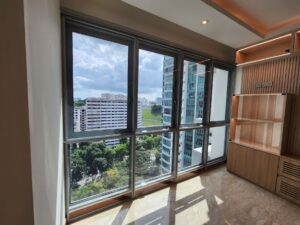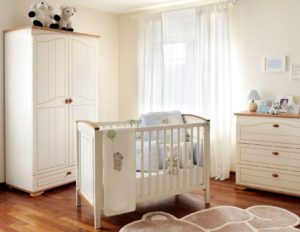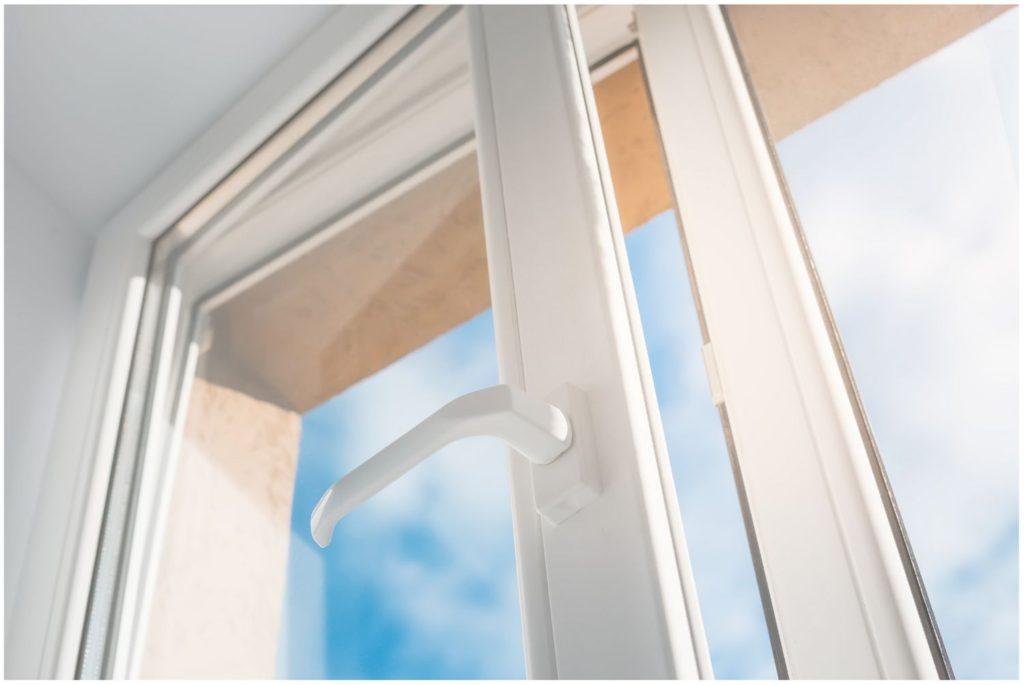
The most common term clients are familiar with when it comes to window soundproofing is double glazing. In this article we investigate which double glazing can help with your noise issues.
The origin of double glazing
Windows are the largest source of energy loss in a building. In the second half of the 20th Century increased window sizes and rising energy costs demanded a more energy efficient solution for windows. Adding a second layer of glass, either in form of a removable storm window panel that would be added in winter, or by installing windows with double insulating glass (IU) offered an extra layer of protection from the cold weather entering through windows and to lower energy costs. The modern double-glazed window was born.
What exactly is double glazing?
Technically, all solutions that include two sheets of glazing could be considered double glazing. Laminated glass, storm windows, retrofit double glazing are all “double-glazing” solutions. However, the term double glazing is conventionally used for IGUs -Insulated Glass Units- consisting of two panes of glass within the same frame, separated by a sealed air space. Thickness and type of glass (like Low-E), air-gap between the two panes and filling (air, argon or krypton gas) of the space varies and the endless combination possibilities will influence the performance and price. It is important to be aware that just because something is labelled “double glazing” it is no assurance that it will perform well or is worth the money that is spent. This is a technical topic but it will be well worth familiarizing yourself with the details to ensure you spend your money on the right solution.
Advantages of double glazing
Double glazed windows, especially when coupled with a solar film, are excellent at reducing heat and cold transmission. A double-glazed unit can easily be 80% as thermally efficient as a single glazed one. This makes your home more comfortable as it is simpler to cool, reduces energy costs for air-conditioning and makes your home more environmentally friendly by using less electricity.
Double glazing can also help in reducing noise, however, only if installed in a system that is suitable for soundproofing.
In this blogpost we elaborate more on the need to use soundproof materials for the entire window to have the desired result.
How do I choose double glazing that is right for me?
In order to choose the right double-glazing solution for your home it is important to consider your specific needs. Are you mainly looking for heat reduction or sound reduction? Can you change your existing window? What is your budget? How thick of a window section can be used to allow for a suitable airgap for your noise situation?
If you are looking to reduce heat transmission, the most important factors to take into consideration is the type and quality of the glass, the type and quality of the spacer and its seals and what the gap is filled with. As there are so many different options and combinations possible, the safest way to navigate this information jungle is to ask the supplier for test certificates. For heat, ask your supplier for the u-Value of the glass. If your windows will have aluminium frames, a u-Value of 2.5 of the glass will probably be a good fit. With thermally broken aluminium or uPVC frames it makes sense to spec the glass according to the u-Value of the framing system.
If you are looking to reduce sound, look for thickness & type of glass and airgap (read more about the airgap here). Ideally you want a minimum glass thickness of 6mm and an airgap of at least 25mm. The rating to ask your supplier for is the STC (Sound Transmission Class). If you are not building a recording studio then a STC 37-39 is sufficient.
Make sure to ask your supplier for 3rd party test results for the entire system, this is true for thermal efficiency as well as for sound. To pay for glass that significantly outperforms the framing and locking system will not give you a good return on your investment, do make sure the test results you are shown cover the entire window system, not just the glass. This blog post explains more about the need of the entire window system to be suitable for soundproofing.
To understand what type of system you were offered, this is how to read it:
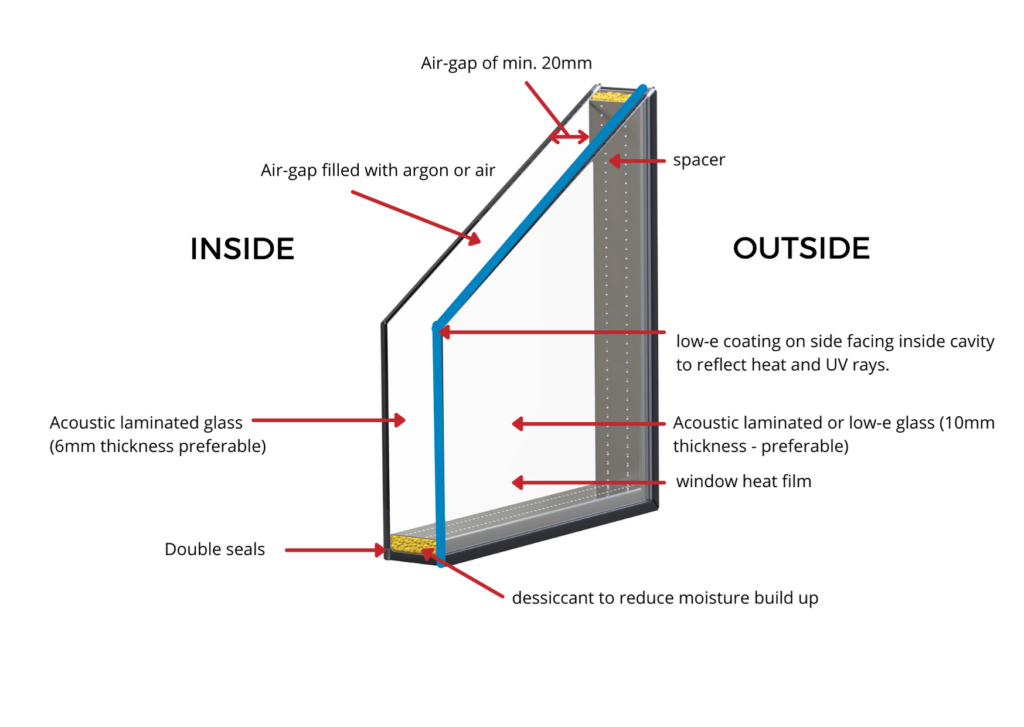
Can’t I simply change the glass in my existing window frame to double glazing?
While this sounds like a tempting option, this will not deliver the desired effect. Replacing your glass in an existing window frame will not provide the same outcome as installing a new soundproof window and could in fact make the situation even worse. Window frames are designed to hold a certain thickness and weight of glass and adding more could warp the frame causing the glass to move down or become loose, affecting the functioning of the window.
Imagine putting a Ferrari engine into a Honda Fit. This will make our Honda go faster in a straight line. But once we try to break it will become clear that upgrading only one part of a system makes it more unsafe and unstable than the original. When upgrading a car, the first thing that needs to be improved are the breaks. With a window, the first thing we need to improve is the general quality of the window system and how well it can seal.
For most windows in Singapore the glass is not the only weak spot for noise transmission. The noise can come straight through your aluminium frame sections if they are hollow. Without multipoint locking pressing the sash to the frame, air leakage will bring outside sound with it. The entire window system needs to be upgraded to be able to work together as a system to provide better soundproofing results.
If changing to a new soundproof window system is not possible, the best solution is a retrofit double glazing system like our Magnetite Noise Shields. Magnetite is considered retrofitted or add-on double-glazing as it is installed in front of the existing window. We use the existing window glazing as the first layer and install our acrylic Noise Shield panel as the second layer, with a space of up to 100mm away from the first window, thus creating a generous air-gap that is totally sealed off to prevent air and noise leakage. This solution can perform exceptionally well in situations where changing the window is not possible and is also applicable to sliding windows and doors.
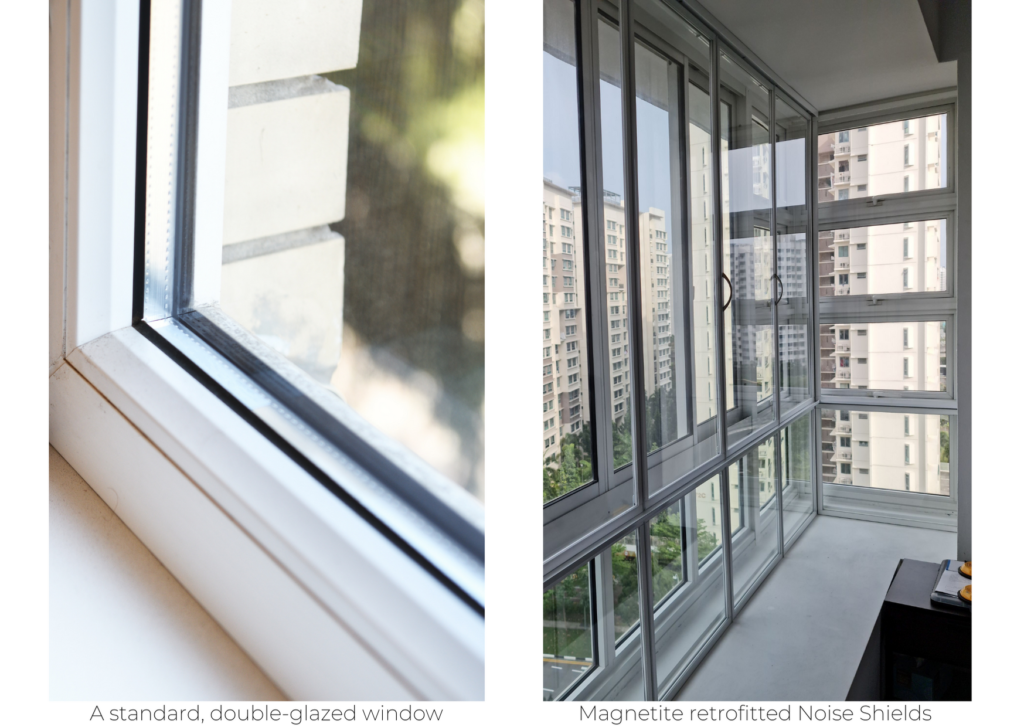
To summarize, double glazing was invented for thermal comfort and can work extremely well for sound reduction if installed in a soundproof window system or as secondary glazing system with an air gap.
In our next article, we will look deeper into the science behind glass and acrylic for soundproofing and how they impact the overall noise reduction results.

